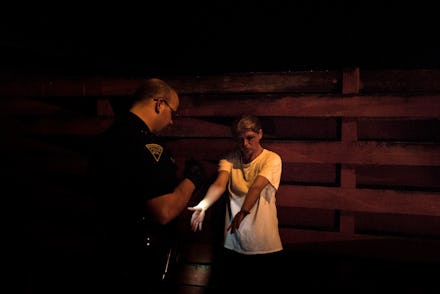Dear President Trump: Don’t ignore the successes of opioid treatment in cities like mine

Opioid addiction is a disease, not a moral failing — and jailing those suffering from addiction is not the answer. That’s a lesson communities like mine have learned the hard way, from the crack epidemic of the 1980s, to the failed “Just Say No” campaign, to now.
It’s time for America to face the truth: The opioid crisis is a public health crisis. We cannot arrest our way out of it.
In Huntington, West Virginia — the city of 48,113 of which I am mayor — we face that reality every day. Fully 20% of all babies born in our two local hospitals have neonatal abstinence syndrome, meaning that they were exposed to opioids while still in the womb. Our syringe exchange program serves 200 people each week; in August 2016, we saw 28 reported overdoses in just one five-hour span. But the damage is not just counted in overdoses and lives lost: This crisis is tearing apart the fabric of our community.
Huntington is hardly alone. Opioid addiction is now the worst drug crisis in our nation’s history, killing 90 Americans each day in 2015 and leaving hundreds more homeless, penniless and physically destroyed.
So I was initially heartened by the president’s creation of a special opioid commission — especially because, as a member of the National City-County Task Force on the Opioid Epidemic, so much of the commission’s first interim report mirrored our own.
But the federal government won’t find willing partners on the state and local level if they focus on pushing law enforcement toward harsher sentencing strategies and encourage “roughing up” citizens under arrest as a fundamental part of their strategy. They cannot urge medical interventions while dismantling Medicaid and health care funding. And they cannot ignore cities’ and countries’ most promising approaches to fighting addiction — like diversion programs, needle exchanges, naloxone training or alternatives to arrest — even if they find them politically inconvenient.
By declaring a national emergency, the president is making good on his campaign promise to tackle this growing crisis, but his administration cannot and should not overlook our city-county task force’s most important recommendation: The need for alternatives to incarceration for those suffering from addiction.
In Huntington, I’ve witnessed firsthand what experts have long pointed out: Jailing those suffering from addiction doesn’t help their recovery. Beginning in 2015, we turned to alternative strategies, like a pre-booking diversion program that refers low-level drug offenders to treatment centers and community services. We train our police officers to understand the early signs of addiction, allowing them to direct those with substance abuse problems into treatment programs.
Incarcerating low-level drug offenders in one of West Virginia’s regional jails costs $48.25 per day, and, without treatment, they almost always relapse. But our community-oriented recovery centers help get people back on their feet for two-thirds of the cost of incarceration.
Treating opioid abuse as a public health crisis, rather than treating victims of addiction like hardened criminals, is not only the right thing to do, but it’s cheaper for taxpayers.
Through my work with the National League of Cities, I’ve met countless other city leaders who understand that support, treatment and flexibility are our most powerful tools. The approach we’ve taken in Huntington has also proven successful in cities across the country, from Laconia, New Hampshire, to Seattle.
None of this means that lawmakers are getting “soft on crime.” Cities that aggressively pursue drug traffickers can still prioritize treatment for individuals with addiction. Models like city drug courts can successfully fight relapse and recidivism, as when Huntington’s Office of Drug Control Policy developed a specialized track for female sex workers struggling with addiction.
Of course, individuals who break the law certainly need to be held accountable. But mandatory sentencing without flexibility only ensures that the mistakes of the past 20 years of drug prosecution will continue — with the same disastrous results.
America’s city and county leaders are eager to work with the federal government. Cities like Huntington are small enough to try innovative approaches and serve as models for the rest of the country. One such example is our partnership with Marshall University in Huntington to train medical students to identify early markers for addiction in patients, deputizing the entire medical community for opioid addiction support.
Declaring a national emergency has provided the framework to discuss and share these approaches, from the White House to state houses to city halls. The federal commission has taken a good first step — but for communities like mine, it’s a first step on a long road to healing our citizens and our community. We need to keep walking.
Steve Williams was elected as Huntington, West Virginia’s 47th mayor on Nov. 6, 2012. Under Williams’ leadership, Huntington has gained national recognition for a number of addiction treatment initiatives, most notably the establishment of the Mayor’s Office of Drug Control Policy.